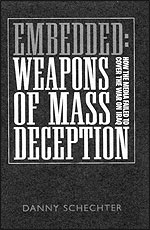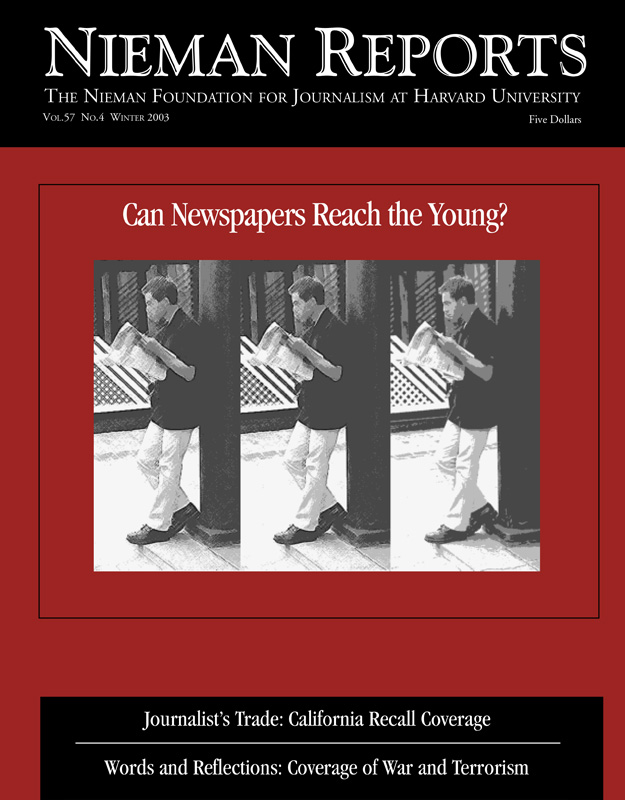 Embedded: Weapons of Mass Deception: How the Media Failed to Cover the War on Iraq
Embedded: Weapons of Mass Deception: How the Media Failed to Cover the War on Iraq
Danny Schechter
Prometheus Books. 286 Pages. $26.
In a chapter entitled “What Can We Do About It?,” Mediachannel.org founder and media observer Danny Schechter, a 1978 Nieman Fellow, writes a posthumous letter to former CBS news correspondent Edward R. Murrow. In it he wonders what happened to the kind of reportorial courage that Murrow showed in his news coverage of Senator Joe McCarthy’s hearings on Communists in the United States. Excerpts from this letter follow.
“Dear Ed:
“I got the idea of writing to you after visiting the Edward Murrow School of Communication out in the wheat fields of Washington State. I had come to debate the coverage of the Iraq War with a group of mainstream journalists, who surprised me by how they were willing to be candid outside their institutional settings. …
“Your work shaped my idea of what a journalist should be. Your guts in taking on [Senator] Joe McCarthy later showed me that a reporter could stand up for truth.
“You used to talk about ‘illuminating’ issues, not just reporting them.
“Anyway, here we are in 2003. You have been long gone, and I am trying to honor your memory by pounding away at what’s happened to media institutions that ‘back in the day’ showed such great promise. …
“Your broadcasts are still listened to in journalism classes, still revered. How much of the media coverage of the Iraq War will ever be regarded that way? Alas, so much of what we produce today is forgettable, disposable, even embarrassing. Sometimes it is thought of as a ‘product’ to be recycled into retrospectives or used as archival material as today’s breaking news becomes grist for tomorrow’s History Channel specials. …
“What you had then is what so many of today’s self-styled experts and oh, so authoritative newscasters lack today—a sense of humility that admits that none of us are know-it-alls. It is a stance that concedes that today’s news is just a first and often flawed draft of a history still to be written. …
“A final relevant recollection comes from one of your producers, Joe Wershba, who wrote a book about your work and times. He tells of a moment when many at CBS had second thoughts about going after McCarthy’s Red Hunt. They wanted to kill the broadcast. You observed, as you listened but did not bow to the fears of your colleagues: ‘The terror is right here in this room.’
“And so it was—and so it is today when journalists hesitate to challenge the dominant storyline for fear of appearing unpatriotic. …
“Some things don’t change. Media institutions remain citadels of conformity, conservatism and compromise. Courage is in short supply in our unbrave world of news because it is rarely encouraged or rewarded, especially if and when you deviate from the script. Ask Peter Arnett. There is little space, airtime or support for those individuals in the media who stand alone, who do it their way, who at times dissent to challenge the paradigm or who suspect that today’s emperor has no clothes. …
“This book looks at how media outlets bought this whole distorted story, and then brought it to the rest of us. …
Many media people remain defensive, far more willing to point their fingers at government deception than their own. ‘I really want to read a book by someone who wasn’t there,’ was the dismissive response I received when I offered to send this book to a military correspondent on a newspaper in Atlanta.
“That may sound like [a] fair point. But the fact is that many of those who were there had no idea of the picture that most of [us] were getting, or how it was hyped, exaggerated and shorn of context. The value of news has to be evaluated by its consumers, not its originators. …
“Perhaps it’s too soon for many in the media to recognize these truths. At the same time, I am sure that much of what I have to say, and perhaps even how I say it, is far too ‘unobjective’ for many in the media trenches to ‘get.’ Most distrust personality-inflected commentary from independent journalists who deviate or dissent from the straight and narrow, or even from the more predictable left-right divide. …
“So Ed, I just wanted you to know that war reporting today has become just as controversial as some of your programs on the red scare were way back when. …
“My hunch is that the analysis offered in these pages may have seemed too far out to some in the war’s immediate aftermath but will, in its essentials, be accepted down the line. …
As you put it once, ‘the obscure we see eventually. The completely apparent takes a little longer.’”



